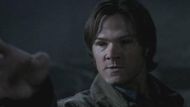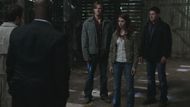Supernatural lasted for 15 seasons, giving us an unforgettable ride of epic fights, emotional scenes, and convoluted plotlines. But despite all its legendary moments, the show was not without its flaws. Whether it was an abrupt character change, unexplained changes to lore, or plot points that didn't quite make sense, some plots left viewers scratching their heads. Throughout the years, Supernatural was a master at getting away with the unexpected, but not every one of its surprises was satisfying.
From the enigmatic Colt, which might kill anything but was ultimately made obsolete, to Mary Winchester's resurrection, a central character whose return lacked the emotional weight it had potential for, certain choices didn't sit well with audiences. Plotlines such as Sam's demon blood storyline, which was hyped up as a significant part only to be abandoned, or the neglect of the Men of Letters, seemed misplaced in the grand scheme.
As we look back on these moments, we'll explore 10 of these plot points that appeared to disrupt the rhythm of the series or left viewers wondering where things were going. In spite of these road bumps, Supernatural is still a fan favorite with a deep mythology that continues to enthrall viewers.
10 Supernatural plot points that do not seem to fit well
1) The Inconsistent Use of the Colt

Previously glorified as the most powerful weapon, the Colt could allegedly slay anything paranormal. It was introduced in Season 1 and granted the Winchesters a significant advantage until the laws constantly changed. Then, demons such as Lucifer and Eve and eventually gods, developed immunity. That went straight against its lore and left people questioning its value. The showrunners usually just shelved it when convenient, despite it being potentially game-changing in story arcs. In Season 12, its final downfall carried no significant weight. What began as a mythic artifact became a muddled relic, demonstrating the way that the show rewrote its own mythology to accommodate new threats on occasion.
2) Sam’s Demon Blood Arc Going Nowhere

Sam's demon blood addiction was one of Supernatural's strongest early storylines. It connected to Azazel's master plan and made Sam a possible antichrist-like character. But once the Lucifer confrontation in Season 5, the plot fell apart. The trauma and abilities tied to the blood were never really explored again, despite them being the defining part of Sam's character for years. Later seasons hardly ever referred to it, even though they dealt extensively with supernatural DNA and heritage. This sudden drop-off seemed like a missed chance to further explore Sam's identity and destiny conflict.
3) Introduction of the Men of Letters

When the Men of Letters were brought into Season 8, they seemed like a highbrow but belated addition to the Winchester pedigree. They introduced intriguing lore, but it was a stretch that neither Bobby nor John ever spoke of them. Now the Winchesters had a secret hideout and a centuries-long heritage of rifle-wielding experts and intellectuals. While the idea introduced complexity and intrigue, it also rewrote the show's gritty hunter beginnings. Even more perplexing, this formidable organization had little impact during previous apocalyptic threats. Though interesting, the Men of Letters seemed like a convenient retcon that conflicted with Supernatural's initial world-building.
4) Dean Becoming a Demon (and It Ending Quickly)

Season 9's finale stunned viewers by demonizing Dean. The possibilities were enormous: a darkened arc of his darker half, guilt, and power. But the hype died quickly; by Season 10, he was cured in three episodes. Rather than milking the tension, the show played it safe. Demon Dean was a moody drunk more than a legitimate villain. The Mark of Cain storyline went on, but the fundamental change was not fully explored. This bait-and-switch frustrated fans, as it promised a daring new direction and fell back into comfortable beats, squandering a huge chance at character development and risk.
5) God (Chuck) as the Ultimate Villain

Transplanting Chuck to the ultimate big bad was a huge plot switch, and all were not initially pleased. Before, he had been a gentle, gangly prophet who just loved the Winchesters. His abrupt development into an ego-driven, cosmos-destroying deity felt uncomfortable. Although meta-references concerning storytelling and destiny were genius-level, the decision conflicted with Chuck's originally developed personality. Fans argued on whether this would be genius or a betrayal. It also flattened previous arcs, so the battles of the brothers seemed like stage-managed set pieces. By attempting to tie up the loose end with a celestial foe, Supernatural risked negating all those years of emotional and ethical complexity.
6) The Return of Mary Winchester

Bringing Mary back in Season 11 was promising, particularly because her death was the inciting incident for the entire series. But her return didn't pan out. Rather than having her storylines be emotional, they tended to feel disconnected and forced. Her aloofness didn't fit fan expectations, and her joining the British Men of Letters only made her more isolated. Though investigating a mother out of time was an interesting concept, it never felt emotionally coherent with the continuation of Sam and Dean's growth. Ultimately, Mary's return felt like a subplot rather than an affecting family reunion, wasting a once-in-a-blue-moon opportunity for rich emotional connection.
7) Heaven and Hell’s Poor Management

Throughout the series, Heaven and Hell changed hands like revolving doors. One minute, Crowley rules Hell with sarcastic panache; the next, it's Lucifer or some demon of the moment. Heaven's not much different; its ruling changes from Zachariah to Naomi to Metatron and continues on. Those changes often were not weighted, so that heavenly politics seemed wobbly and cartoonish. Key characters such as Raphael or Abaddon were brought in with a threat, only to be dismissed suddenly. Rather than being intimidating cosmic forces, both worlds tended to come across as disorganized offices plagued by poor HR. This inconsistency undermined their menace and the show's mythological stakes.
8) Jack Becoming Overpowered

Jack Kline, Lucifer's Nephilim son, was brought in with great depth. Initially, he grappled with morality, power, and acceptance, a welcome change. But eventually, he turned into a deus ex machina on legs. Need to open a portal? Jack can do it. Defeat an ancient god? Jack's got it. His vast powers tended to dispense with suspense, solving problems that previously needed grit and sacrifice. By Season 15, he even tapped into God's power, which was hurried. While Alexander Calvert performed well, Jack's quick development from clueless teenager to all-powerful messiah undermined the balance of the show and trivialized the Winchesters' fight.
9) The Empty’s Confusing Purpose

When The Empty was first brought in, it was horrifying, a never-ending, black nothingness where angels and demons go to really die. The Entity that governed it was bizarre and unknowable, bringing cosmic horror to the series. But then, The Empty's tone and purpose changed completely. It began making bargains, showing emotions, and even serving as comic relief. Its rules got murky, some creatures came back, others did not, and no specific criteria were established. By the end of the final season, it was a narrative device instead of a narrative given. What initially was an ominous sign of totality lost impact, weakening the stakes it purported to embody.
10) The Series Finale and Dean’s Death

Having vanquished God, supporters were expecting an epic, befitting conclusion. Instead, Dean succumbed to infection from a rusty nail while on a standard hunt, a jarringly mundane death for a man who battled angels, devils, and gods. Some liked the pragmatism, but most felt it diminished his standing. The finale went big on sentimentalism but provided little resolution for major storylines. Sam's future was glossed over through a montage, and Castiel's was left hanging. Though the show had dealt with death and sacrifice numerous times, this conclusion was unbalanced following such cosmic stakes.
Although Supernatural did have its share of inconsistencies, these instances don't make up the show. Even with the confusing plot twists, wasted characters, and changing rules, Supernatural was still a favorite show that won over the hearts of millions. Its lasting legacy is in its characters, the emotional depth of its narratives, and the humor that offsets the darkness. Flaws and all, the show's influence on pop culture cannot be denied. These plot twists can be considered missteps, but they do not overshadow the numerous masterful moments that made Supernatural a gem in TV history.
